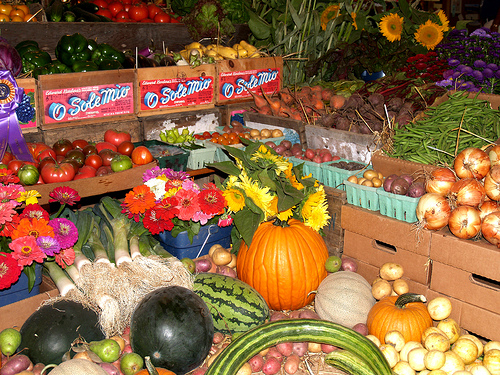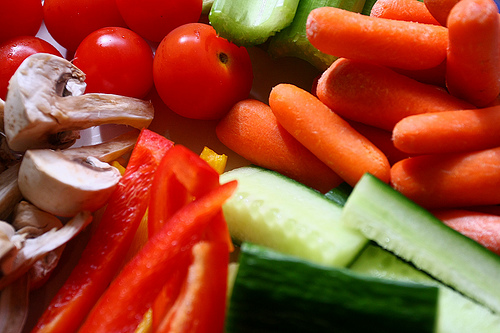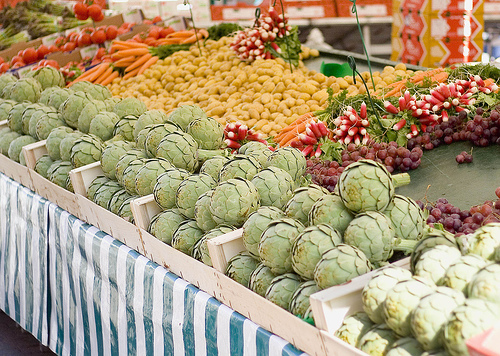
We all need to eat more vegetables. Even the vegetarians I know complain that they don't eat enough vegetables. No one can eat enough, but we all know that we should.
Vegetable benefits
Everybody knows that vegetables have nutrients. Important nutrients that keep you healthy and active. But a lot of people do not fully appreciate the role of fiber in their diet. Vegetables are a great way to get fiber, both soluble and insoluble.

Image courtesy Flickr/Martin Cathrae
We as a nation are falling woefully short of the necessary fiber intake per day. This leads to a whole host of internal problems, from bowel irregularity to diverticulitis. Fiber is important, and vegetables are an ideal source of it.
How many vegetables should you be eating?
It depends on who you ask. And unfortunately, everyone's got an agenda. For example, the US government recommends 2.5 cups of fruit and vegetables a day. But they also recommend 6 ounces of grains in the form of bread and pasta, as well as 3 cups of milk and other dairy products. Neither of these things are nutritionally necessary, but both of them are recipients of huge amounts of government subsidies.
The US government has a vested financial interest in selling a lot of wheat and dairy products, so it's no surprise they recommend that you eat a lot of them. Who's to say what their recommendation would look like if they removed the "Grains" and "Milk" section from their chart?

Image courtesy Flickr/comprock
What about taking vitamins?
If one of the big benefits to eating vegetables is the vitamins, why not just take vitamins and call it good? After all, vitamins are easy to store, don't require any prep time, and are nicely portable.
However, it's entirely possible that taking a multivitamin is utterly useless. In fact there are many vitamins and minerals which we know are useless to take as supplements. You can't just extract one tiny part of a vegetable, put it in a pill, and expect it to work the same. The world doesn't work that way.
For example, lycopene is one of the most powerful micronutrients found in tomatoes. However, if you extract lycopene and put it in a supplement, it doesn't work. Something about consuming lycopene in tomato form is what does the trick. Perhaps it's an interaction with other elements of the tomato, perhaps the lycopene is useless in isolation. Or maybe the process of extracting it and fixing it in vitamin form destroys the lycopene, rendering it inert. We don't know. But we do know that if you want the health benefits from eating tomatoes, you should eat tomatoes.

Image courtesy Flickr/enrick.archivell
Strategies for eating more vegetables every day
I have found that while I am sitting at my desk working, any food within arm's reach gets eaten. Surprisingly, this isn't just true for candy corn and potato chips: the phenomenon also holds true for raw vegetables.
Try putting a dish of baby carrots out on your desk first thing in the morning. There is a good chance you will find yourself snacking on them throughout the day. Boom, there's a serving of vegetables added to your intake with no stress or fuss.
Smoothies are also a great way to tuck vegetables into your daily meals. I make a green smoothie with a banana, a scoop of vanilla protein powder, and a handful of greens. After experimenting with various greens, I have settled on baby spinach. It blends up the best, has the most mild taste, and you can buy big bags of pre-washed baby spinach leaves at the store. All you have to do is open the bag and grab a handful.

Image courtesy Flickr/neonbubble
I am also a big fan of the new breed of "steam in the bag" vegetables. There are two kinds: fresh and frozen. Both can be cooked by just tossing the bag in the microwave for a few minutes. So easy!
The frozen "steam in the bag" usually have a yummy sauce in the mix. It adds fat and calories, but it makes eating vegetables much more delicious and easy. The raw kind are found in the produce section, and also work well as crudites. I am particularly fond of a variety Safeway sells which has cauliflower, broccoli, and baby carrots. Great for dipping in hummus!
If you really can't bring yourself to eat vegetables at all, or you're trying to trick your kids or partner into eating more, then it may be time for more radical strategies. There is an entire recipe industry devoted to hiding vegetables in food. The Sneaky Chef offers hundreds of recipes with vegetables hidden in unlikely places, like meatballs and brownies.
Main image courtesy Flickr/Professor Bop

0 comments